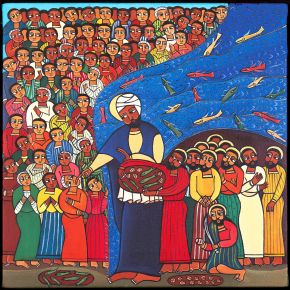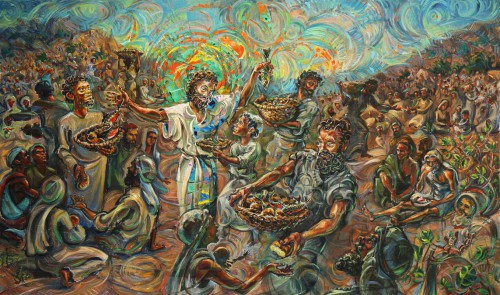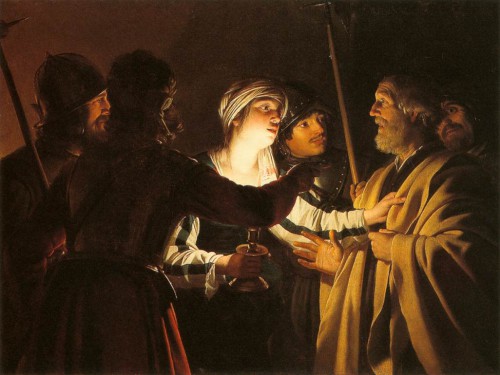
From today’s lectionary reading, Mark 8.27-9.1:
Jesus went on with his disciples to the villages of Caesarea Philippi; and on the way he asked his disciples, ‘Who do people say that I am?’ And they answered him, ‘John the Baptist; and others, Elijah; and still others, one of the prophets.’ He asked them, ‘But who do you say that I am?’ Peter answered him, ‘You are the Messiah.’ And he sternly ordered them not to tell anyone about him.
Then he began to teach them that the Son of Man must undergo great suffering, and be rejected by the elders, the chief priests, and the scribes, and be killed, and after three days rise again. He said all this quite openly. And Peter took him aside and began to rebuke him. But turning and looking at his disciples, he rebuked Peter and said, ‘Get behind me, Satan! For you are setting your mind not on divine things but on human things.’
He called the crowd with his disciples, and said to them, ‘If any want to become my followers, let them deny themselves and take up their cross and follow me. For those who want to save their life will lose it, and those who lose their life for my sake, and for the sake of the gospel, will save it.For what will it profit them to gain the whole world and forfeit their life?Indeed, what can they give in return for their life? Those who are ashamed of me and of my words in this adulterous and sinful generation, of them the Son of Man will also be ashamed when he comes in the glory of his Father with the holy angels.’ And he said to them, ‘Truly I tell you, there are some standing here who will not taste death until they see that the kingdom of God has come with power.’
The portrait of Jesus here is a touching one. You can almost sense a doubt, or at least a confusion, in this and the passages running up to it. He has sought solitude more frequently, and he seems preoccupied by evaluating his reception and covering up his identity. Why cover it up? Why does the ‘Messianic secret’ (“ordered them not to tell anyone about him”) go hand-in-hand with this prediction of his death?
(painting by Eric Feather)
First, why the secret? Perhaps Jesus wanted freedom from the burdens of celebrity/notoriety, or perhaps he wanted to wait until the right moment to unveil his identity. But I like an explanation proposed by Kierkegaard: that direct communication of Christ’s message was impossible, his message not being a piece of news for ordinary language, but something touching on our innermost, ineffable subjectivity.
Because direct communication would constantly lend itself to misunderstanding, and those misunderstandings would be based on our penchant for glory, control, and doing things our own way. Satan appealed to such a misconstrual of his Messianic identity: You’re the Messiah – neat! Let’s check out that invincibility thing (Mt 4:6, paraphrase). It was the same with the people he encountered: they try to forcibly make him king, and even Peter misunderstands him, repeating Satan’s temptation: humiliation and suffering cannot be God’s plan, least of all with you.
So on this reading of the ‘Messianic secret’, as soon as Peter recognizes him for who he is, he must immediately preempt any misunderstanding: the Son of Man will be rejected and killed, even must be rejected and killed.
He also immediately lets his followers know that they, too, must “take up their cross and follow me.” This expression has become over-familiarized and should briefly be refreshed: take up their cross literally means to shoulder a heavy, burdensome beam of wood and carry it toward the waiting post to which it will be fastened in crucifixion. And “follow me” here does not mean a general walk with Jesus, but again a walk to one’s death – following Jesus into suffering, rejection, and death. The journey on which they are called to follow is not a Christian life or a relationship with God, but a specific journey, a journey into death.
You get the sense that Jesus wants to lay all the cards on the table here, in an almost pitiable way. His friends may be in it only for the glory – the healings, the teachings, a possible end to Roman occupation and a new era for Israel. But he will not let them be deluded; this is the sad lot they face by association with him. It’s like a spouse confessing some awful flaw: this is not who you want to me to be, but it is who I am – I’m in this if you are, but you should know what suffering this will cause you.
And he asks them not to be ashamed of them. When we read that now, we tend to think that we should never shirk from identifying ourselves as Christians, no matter how unfashionable or uncool. But again we could try to uncover a more original meaning: what would have made the disciples ashamed? Certainly Jesus is referring first to his coming suffering and humiliation, and perhaps second to his association with sinners and coming religious ostracism. They might be ashamed of being companions of a religious outcast and undesirable; in the end, a common criminal to die for blasphemy and alleged political grandstanding (“King of the Jews”).
So perhaps we are called not so much to be unashamed of our status as Christians, but to be unashamed of our status as recognizable sinners, to associate with people who are lowly, abject, pitiable, or criminal.
And Jesus being ashamed of us when he comes into his glory? Again, the word ashamed should give us pause: it does not simply mean that we will be damned or rejected or judged more harshly. What is it about our being ashamed of Jesus that would make him ashamed of us? Perhaps that very entitlement, that sense of being too good to identify with others or to admit our own weakness. Like bringing an outsider to a party, an outsider who wastes no time showing contempt for the other weird or annoying people there – ‘sorry, guys, I just thought he’d appreciate the invitation; had no idea he had such a sense of entitlement’. In other words, it may be precisely our pride and spiritual entitlement which would be shameful, recipients of a great gift who think, deep down, that we at least partially deserved it.
 So the shape of the life into which Jesus asks his disciples to follow him is cruciform, one of self-renunciation and downward movement, emptying oneself of all entitlement and spiritual pretension (kenosis) through a close joining with Christ’s life and mission. Can they get on board?
So the shape of the life into which Jesus asks his disciples to follow him is cruciform, one of self-renunciation and downward movement, emptying oneself of all entitlement and spiritual pretension (kenosis) through a close joining with Christ’s life and mission. Can they get on board?
The short answer is no. Peter, the one who recognizes Jesus as Messiah, keeps falling into all the religious traps. He cannot accept, at least at first, Jesus’ footwashing: again, to use an analogy from etiquette, he’s like a restless dinner-guest who cannot bear to be the object of someone else’s generosity but keeps bustling around and interfering, trying to do an equal share of the work. Perhaps he even brings his own plates and food in an effort to contribute something of his own, slighting the (Lord of) host(s) in the process. He impugns Christ’s generosity by initially isnisting on bringing something of his own.
Peter’s “Satan[ic]” attitude towards Christ’s destiny will continue as he tries to resist Jesus’ arrest with violent force. And, exasperated that Jesus won’t let him do anything to bail out the sinking ship, Peter jumps off of it, famously denying to even know this Savior-turned-criminal. He is literally ashamed of the Son of Man, in exactly the way Jesus feared.
Despite Peter’s being ashamed and despite his inability to follow Jesus into rejection and death, he too is forgiven; his denial itself works as a means to strip Peter of any claim to righteousness. Peter, the model of the Church, will continue to mess up: his Jerusalem church will falter, and he will fall into ethnocentric legalism (Gal 2:11). We are called to be unashamed, not first and foremost of our profession to be Christians, but rather of suffering, lowliness, and even religious rejection. And none of us quite can, but even our persistent refusal to follow Jesus, even our shame in his way of doing things, is taken on by him in the moment of crucifixion: it is put to death along with the Old Adam. The pattern of the Christian life is cruciform, but even when we fail to embrace that and cling on to our desire for control, our need to contribute to salvation, our religious fantasies of personal glory or crusading against evil, sword in hand; Jesus still follows the Father’s call and is obedient unto death in our stead.

COMMENTS
One response to “A Long-Winded Thursday Devotional: Too Religious Not to Be Ashamed”
Leave a Reply















Really helpful, Will. Thanks!